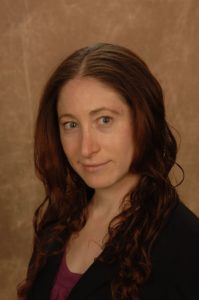Schecter’s book on ‘split’ consciousness out June 1
From the WashU Newsroom…
Each of them, despite being two thinking things, is one of us — one person.
It is an odd sentence to most, but not to Lizzie Schechter, assistant professor of philosophy and philosophy-neuroscience-psychology, both in Arts & Sciences, at Washington University in St. Louis.

Schechter
Schechter researches consciousness, the unities and disunities of mind, and personal identity. In her forthcoming book, she considers some of the most intriguing psychology patients to ever have submitted to research, subjects who have had the hemispheres of their brains — and perhaps their minds — severed in two.
In her book “Self-Consciousness and ‘Split’ Brains: The Minds’ I,” which will be published June 1 by Oxford University Press, Schechter asks linguistically simple, but metaphysically puzzling questions: In a single body, how many minds are there? How many people?
In the second half of the 20th century, surgeons performed dozens of operations on people with severe epilepsy to ease the frequency and intensity of seizures. The surgery involved severing a significant part of the corpus callosum, a dense bundle of nerve fibers that connect the left and right hemispheres of the brain, facilitating communication in and integration of the brain in a non-severed brain.
The surgeries were more or less successful, but experiments revealed unusual side effects.
“The two hemispheres begin to operate independently of each other,” Schechter said, “not totally, but to an unusual degree.”
For instance, each hand sends tactile information to the opposite hemisphere; touch something with your left hand, and the information is sent to your right hemisphere, and vice versa. If your corpus callosum is intact, no problem. The information travels through those nerves and is available to both your left and right hemispheres. But odd things happen when that connection is severed.
“Imagine blindfolding a split-brain patient so that they cannot see what you’re putting in their hands,” Schechter said. In their left hand they get a pipe. In the right, a pen. Then ask them what they are holding.